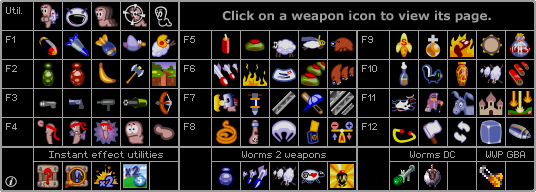Difference between revisions of "Pneumatic Drill"
From Worms Knowledge Base
(The previous measurement was made with an more ideal PRNG substituted for the real one... apparently that makes a significant difference.) |
(forgot to update confidence intervals) |
||
| Line 49: | Line 49: | ||
Its maximum damage is "shared" with the [[blowtorch]], which only matters when [[RubberWorm|RubberWorm's]] ''shot doesn't end turn'' mode is on. This means that the sum of the damage dealt by pneumatic drill and blowtorch in one turn to a single worm can not exceed a certain amount defined by the power setting. In case of different settings, the weaker one is used. | Its maximum damage is "shared" with the [[blowtorch]], which only matters when [[RubberWorm|RubberWorm's]] ''shot doesn't end turn'' mode is on. This means that the sum of the damage dealt by pneumatic drill and blowtorch in one turn to a single worm can not exceed a certain amount defined by the power setting. In case of different settings, the weaker one is used. | ||
| − | The depth of the hole varies randomly, closely approximating a Gaussian distribution (bell curve), possibly closer to a compound Poisson distribution. The average (mean) digging depth, calculated from a test sample of 5401711 drillings on solid flat terrain, is '''164.9 pixels''', with a standard deviation of 17.2 pixels (and the median and mode are both 165 pixels). In 95% of drillings, the depth will be within the range | + | The depth of the hole varies randomly, closely approximating a Gaussian distribution (bell curve), possibly closer to a compound Poisson distribution. The average (mean) digging depth, calculated from a test sample of 5401711 drillings on solid flat terrain, is '''164.9 pixels''', with a standard deviation of 17.2 pixels (and the median and mode are both 165 pixels). In 95% of drillings, the depth will be within the range 132 to 200 pixels. In 99% of drillings, it'll be from 123 to 211 pixels. (The minimum and maximum depths encountered during the test were 87 and 243 pixels, but these would become even more extreme in a larger sample.) The depth is defined as the lowest height a worm can occupy at the bottom of the hole, minus the height of a worm at the surface. |
== Criticisms, Problems and Weaknesses == | == Criticisms, Problems and Weaknesses == | ||
Revision as of 17:14, 23 September 2010
| | |
|---|---|
| Type: | Digging tool |
| Keyboard selection: | F7 (x2) |
| Standard effects: | Vertical tunnel |
| Present in: | W:A, WWP |
| ||||||||||||||||||||||
| Each additional strike by the drill delivers a smaller and smaller amount of injury; each entry in this table shows how the values diminish. |
The Pneumatic Drill allows a worm to dig a hole directly downward through the terrain.
Regardless of power setting, it stays active for a maximum of 5 seconds.
By setting its power, not only the damage caused to a worm changes, but the distance it propels the hit worm too. Also, there is a maximum damage that a worm can recieve during a turn by this weapon.
Its maximum damage is "shared" with the blowtorch, which only matters when RubberWorm's shot doesn't end turn mode is on. This means that the sum of the damage dealt by pneumatic drill and blowtorch in one turn to a single worm can not exceed a certain amount defined by the power setting. In case of different settings, the weaker one is used.
The depth of the hole varies randomly, closely approximating a Gaussian distribution (bell curve), possibly closer to a compound Poisson distribution. The average (mean) digging depth, calculated from a test sample of 5401711 drillings on solid flat terrain, is 164.9 pixels, with a standard deviation of 17.2 pixels (and the median and mode are both 165 pixels). In 95% of drillings, the depth will be within the range 132 to 200 pixels. In 99% of drillings, it'll be from 123 to 211 pixels. (The minimum and maximum depths encountered during the test were 87 and 243 pixels, but these would become even more extreme in a larger sample.) The depth is defined as the lowest height a worm can occupy at the bottom of the hole, minus the height of a worm at the surface.
Criticisms, Problems and Weaknesses
- The direction in which a worm is knocked upon being drilled is randomly left or right; contrary to intuition, it does not depend on the relative positions of the worm being drilled and the one doing the drilling.
Tricks and glitches
- If timed correctly, it is possible to jump right after drilling.
